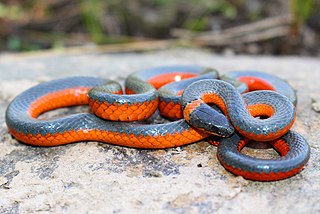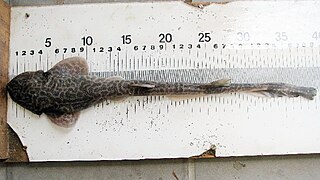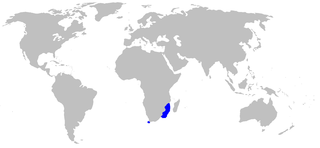
The tuatara is a species of reptile endemic to New Zealand. Despite its close resemblance to lizards, it is part of a distinct lineage, the order Rhynchocephalia. The name tuatara is derived from the Māori language and means "peaks on the back".

The spotted shag or pārekareka is a species of cormorant endemic to New Zealand. Though originally classified as Phalacrocorax punctatus, it is sufficiently different in appearance from typical members of that genus that for a time it was placed in a separate genus, Stictocarbo, along with a similar species, the Pitt shag. Subsequent genetic studies show that the spotted shag's lineage is nested within the typical shags.
Hypostomus punctatus, the suckermouthed catfish, is a tropical fish belonging to the armored suckermouth catfish family, Loricariidae. Hypostomus punctatus is a freshwater fish native to South America, in the coastal drainages of southeastern Brazil and Uruguay. It is one of a number of species commonly referred to as "plecostomus" or "common pleco" by aquarists.

The channel catfish, known informally as the "channel cat", is North America's most abundant catfish species. It is the official fish of Kansas, Missouri, Nebraska and Tennessee. The channel catfish is the most fished species of catfish in the United States, with around 8 million anglers angeling them per year. The popularity of channel catfish for food has contributed to the rapid expansion of this species' aquaculture in the United States. It has also been widely introduced to Europe, Asia and South America, and many countries consider it an invasive species.

The red-spotted toad, formerly Bufo punctatus, is a toad in the family Bufonidae found in the southwestern United States and northwestern Mexico.

Diadophis punctatus, commonly known as the ring-necked snake or ringneck snake, is a rather small, harmless species of colubrid snake found throughout much of the United States, as well as south in Central Mexico and as far north as Quebec, Canada. Ring-necked snakes are generally fossorial and somewhat secretive, by nature, and, as a nocturnal species, are rarely seen during the daytime. These snakes are believed to be fairly abundant throughout most of their range, though no scientific evaluation supports this hypothesis. Scientific research is lacking for the species, despite their apparently common status, and more in-depth investigations are greatly needed. It is the only species within the genus Diadophis and, currently, 14 subspecies are identified, though many herpetologists question the morphologically-based classifications.

The New Zealand fernbird or simply fernbird is an insectivorous bird endemic to New Zealand. In the Māori language, it is named kōtātā or mātātā.

Holohalaelurus is a genus of deepwater catshark belonging to the family Pentanchidae, commonly known as Izak catsharks or hallelujah sharks.

The white-spotted Izak or African spotted catshark is a species of shark belonging to the family Pentanchidae, the deepwater catsharks. It is found in the western Indian Ocean off the coasts of Natal, South Africa, southern Mozambique, Madagascar, Kenya, and Tanzania between latitudes 4° S and 37° S, at depths of between 220 and 440 m. It can grow up to 35 cm in length.

The northern slaty antshrike is a species of bird in subfamily Thamnophilinae of family Thamnophilidae, the "typical antbirds". It is found in Brazil, Colombia, Ecuador, French Guiana, Guyana, Peru, Suriname, and Venezuela.

The small sun squirrel is a species of rodent in the family Sciuridae. It is found in Ivory Coast, Ghana, Liberia, Sierra Leone, and possibly Guinea. Its natural habitat is subtropical or tropical moist lowland forests.

Diadophis punctatus edwardsii, commonly known as the northern ringneck snake, is a subspecies of Diadophis punctatus, a snake in the family Colubridae. The subspecies is endemic to North America.
Babesiosoma is a genus of parasitic alveolates in the phylum Apicomplexia.
Konosirus punctatus is a species of fish in the family Dorosomatidae. It is the only member of the monotypic genus Konosirus. Its common names include dotted gizzard shad and konoshiro gizzard shad. It is native to the northwestern Pacific Ocean, where it occurs along the Asian coastline.
Copelatus punctatus is a species of diving beetle. It is part of the genus Copelatus in the subfamily Copelatinae of the family Dytiscidae. It was described by Bilardo & Rocchi in 1995.

The speckled worm-eel, Myrophis punctatus, is a member of the Ophichthidae family. It was described by Christian Frederik Lütken in 1852. M. punctatus have brown bodies that are lighter on the ventral side than the dorsal side. The upper body is speckled with pepper-like black spots. The snout is pointed. This species has regenerative powers. They grow to a maximum size of 35.3 centimetres.
Morimopsini is a tribe of longhorn beetles of the subfamily Lamiinae. It was described by Lacordaire in 1869.
Dolophrades is a genus of longhorn beetles of the subfamily Lamiinae, containing the following species:
Dolophrades birmanus is a species of beetle in the family Cerambycidae. It was described by Stephan von Breuning in 1958. It is known from Myanmar.
Dolophrades mustanganus is a species of beetle in the family Cerambycidae. It was described by Holzschuh in 2003.











